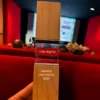Kickmaker is developing a program dedicated to the research and application of standards, rules and frameworks dedicated to the sustainable development of electronic products and eco-deign.

At Kickmaker, a leading design and industrialization firm dedicated to high-tech products, sustainability isn’t just a buzzword; it’s a core principle ingrained in our operations. With a team of over 300 experts spanning various domains including electronics, embedded software, mechanical engineering, New Product Introduction, AI, robotics, and automation, Kickmaker is at the forefront of sustainable innovation. Collaborating with more than 150 clients ranging from early-stage startups to multinational corporations across diverse industries, we’ve developed an innovative approach to screen and develop projects, encapsulated in what we call the 6R Manifesto.
Summary:
-
- The 6R Manifesto: a strategic framework for sustainable high-tech product development
- The Disassembly Map Methodology and Tools
- Repairability Index and Refurbishing Index
- Recyclability Index
- Empowering Engineers for Sustainable Design
- Transitioning to Circular Economy in High-Tech with Kickmaker’s Strategic Approach
- Acknowledgments
The 6R Manifesto: a strategic framework for sustainable high-tech product development
Rethink:
At Kickmaker, we believe that true innovation begins with challenging conventional norms. We leverage our technical expertise and interdisciplinary approach to provide valuable insights during the product definition and specification phases, steering towards more sustainable solutions.
Refuse:
Fighting against programmed obsolescence is a cornerstone of our ethos. We reject projects that don’t align with our environmental objectives and strive to extend the lifespan of products despite rapid technological advancements.
Reduce:
Our aim is not just to create products but to enhance their value and functionality, reducing the overall number of items in circulation. We scrutinize resource usage, cloud services, and energy consumption to minimize environmental impact and total cost of ownership.
Reuse:
Embracing the concept of circularity, we explore avenues for a product’s second life or repurposing of components from the outset. By fostering partnerships and envisioning new applications, we contribute to a more sustainable ecosystem.
Repair:
Integrating repairability into the design phase is paramount for extending product lifespan. We enable easy replacement or upgrading of components to mitigate wear and tear, thus reducing the need for premature replacements.
Recycle:
As a last resort, recycling becomes imperative. We incorporate recyclable materials and manufacturing techniques that facilitate closed-loop systems, minimizing waste and promoting circularity.
The Disassembly Map Methodology and Tools
At the heart of Kickmaker’s sustainability and eco-design program lies a suite of tools and methodologies designed to streamline the development process while prioritizing environmental considerations. One such tool is the Disassembly Map, a comprehensive approach that provides engineers with a holistic view of a product’s complexity.
The Disassembly Map systematically breaks down a product into its constituent parts, mapping out the disassembly process to identify key components and their interdependencies. This enables designers to optimize accessibility, repairability, and recyclability from the outset.
Repairability Index and Refurbishing Index
In conjunction with the Disassembly Map, Kickmaker employs a Repairability Index to assess a product’s ease of repair. This index factors in repair time and complexity, empowering engineers to design for longevity and ease of maintenance.
Additionally, Kickmaker utilizes a Refurbishing Index, which evaluates the residual economic value of components. By considering the potential for refurbishment and resale, we maximize resource utilization and minimize waste.
Recyclability Index
Assessing the recyclability of components is another critical aspect of our methodology. The Recyclability Index evaluates the residual material complexity of components, guiding decisions regarding material selection and end-of-life management strategies.
Empowering Engineers for Sustainable Design
Kickmaker’s commitment to sustainable design extends beyond tools and methodologies; it’s a cultural ethos embedded in our transversal team structure. Our multidisciplinary team of Eco Design Experts collaborates closely with project teams, ensuring that sustainability goals are integrated seamlessly throughout the development process.
From conceptualization to commercialization, Kickmaker’s holistic approach to sustainable design empowers engineers to make informed decisions that prioritize environmental stewardship without compromising on innovation or performance. Together, we’re driving positive change in the high-tech industry, one project at a time.
Transitioning to Circular Economy in High-Tech with Kickmaker’s Strategic Approach
The concept of circularity is experiencing a resurgence in France and across Europe, heralded as a novelty despite being the cornerstone of economies for centuries. The globalization and subsequent acceleration of transportation, coupled with the plummeting costs of fossil fuels, ushered in an era of linear economic models. However, the imperative to combat climate change and reduce reliance on
fossil fuels necessitates a return to circularity. Yet, effecting this shift is immensely challenging, particularly in the High-Tech domain where Kickmaker operates.
The majority of electronic components originate from distant countries, and the expertise in crucial areas such as rare earth minerals and semiconductor technologies is concentrated in Asia. Recognizing these constraints and the significant environmental impact of electronics, circularity in High-Tech products demands an exceedingly tailored approach.
Conscious of these challenges and the need for transformative action, Kickmaker has cultivated expertise to guide its clients along this path.
This methodology hinges on a nuanced understanding of the business, economic, and geographical context. Leveraging specialized consultants capable of grasping strategic imperatives aligned with overarching corporate goals, Kickmaker’s strength lies in its ability to marry business analyses with profound technical and industrial competencies. This fusion evaluates the real potential and the requisite industrial and capital intensity to execute this transformation effectively.
Often, this phase manifests as experimentation, leveraging existing products and industrial ecosystems. Kickmaker adeptly identifies areas for enhancement, both at the product with a mid or long term roadmap and operational levels, fostering collaborations with industrial partners and potentially developing automated tools for a short erm approach.
These initiatives transition from small-scale experimental endeavors rooted in the solidarity economy towards a more industrial approach on a regional scale.
This industrial approach aims to mutualize resources and establish shared manufacturing facilities or processes across territories. These facilities could cater to multiple clients or different phases of the product lifecycle, encompassing manufacturing, reconditioning, repair, or remanufacturing. By harnessing economies of scale and fostering collaboration, Kickmaker’s methodology paves the way for a sustainable and circular High-Tech landscape.
In conclusion, as businesses navigate the shift towards a circular economy, Kickmaker stands at the forefront, armed with a strategic approach that marries business acumen with technical prowess. By embracing circularity in High-Tech, Kickmaker not only addresses environmental imperatives but also fosters innovation and resilience in an ever-evolving landscape.
Acknowledgments
Kickmaker Sustainable Program is fully transversal approach, developed by Denis Mercat , Agathe Vial , Julie Le Roux , Sebastien Lelerre , Paul Boussaroque , Joris Pinto , Joris Agoulon , and integrate all Kickers who actively contribute to this sustainability initiatives. Your dedication fuels our mission to create a more sustainable future for generations to come.


